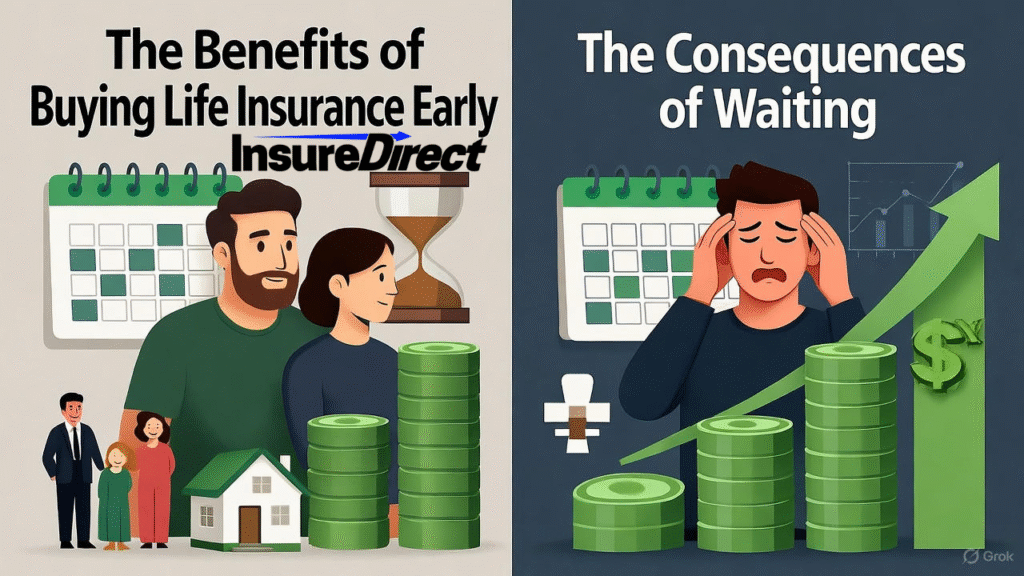Life insurance isn’t the most exciting thing to think about, but timing matters more than most people realize. Waiting to buy? It can cost you — sometimes hundreds or even thousands more over a lifetime.
Why? Age, health, inflation, and life events silently drive up the cost of protection.
Why Buying Early Is Usually Smarter
Many people assume, “I’ll get it later, I’m young and healthy, nothing will happen.” Sure, but insurers don’t see it that way. Rates increase with age, and small changes in health can suddenly make your ideal policy either expensive or unattainable.
Age Matters More Than You Think
A healthy 25-year-old can get a $500,000 20-year term life insurance policy for roughly $20–$30 per month. Delay ten years, and that same policy could cost $50–$80 per month, more than double.
Insurance math is unyielding: age plus risk equals higher premiums.
Health and Lifestyle Affect Rates
Smoking? Higher rates. Diabetes? Extra costs. Weight gain? Premiums go up. Purchasing young and healthy locks at lower rates for decades. Even minor health changes later can push you into a much higher cost category.
Term Life vs Whole Life: Timing Differences
Two main types dominate life insurance: term and whole life. Timing affects both differently.
Term Life Insurance
- Covers a set period (10, 20, 30 years).
- Affordable and perfect for working adults with dependents.
- Buy early: lower monthly premiums. Buy later: significantly higher.
Whole Life Insurance
- Lifelong protection with cash value accumulation.
- Early purchase allows decades of growth and locks in lower premiums.
- Delaying reduces long-term benefits and increases costs.
Inflation: The Silent Cost
Think $500,000 today is enough for your family ten years from now? Maybe not. Mortgages, education, groceries — all increase over time. Buying early ensures your coverage is in place before expenses skyrocket, whereas waiting may require a larger, more expensive policy.
Life Events That Signal You Should Buy
- Marriage: Protect your spouse financially.
- Buying a Home: Large mortgage? Don’t leave family exposed.
- Having Children: Cover long-term expenses like education and childcare.
- Starting a Business: Safeguard your family and business partners.
Delaying until these milestones often makes coverage more urgent and more costly.
How Waiting Increases Costs
- Premiums rise with age — unavoidable.
- Fewer policy options due to health changes.
- Delayed whole life insurance loses cash value accumulation.
- Inflation increases the required coverage amount, costing more.
Even a five-year delay can add tens of thousands of dollars in lifetime premiums.
2025 Buyer Strategies
Technology has made life insurance more flexible than ever:
- Digital apps like Ladder Life, Policygenius, and NerdWallet can produce quotes in minutes.
- Optional medical exams: Some term policies no longer require blood tests.
- AI-driven underwriting: faster approvals, though subtle personal details might be missed.
Pro tip: Always verify with a licensed adviser. Computers are smart, but they can’t fully account for blended families, unusual debts, or unique health conditions.
Hidden Benefits of Early Purchase
- Lower long-term costs: Early purchase locks in lower rates.
- Peace of mind: Your family is financially secure earlier.
- Flexibility: Many early policies allow adjustments or conversions without new medical exams.
- Cash value accumulation: Whole life policies bought young have more years to grow; waiting reduces growth potential.
Common Mistakes People Make
- Assuming employer coverage is sufficient (usually only 1–2× salary).
- Assuming perfect health forever, health changes, premiums rise.
- Forgetting to update beneficiaries after life events.
- Skipping riders like accidental death or critical illness — often inexpensive but valuable.
- Buying too much coverage and neglecting other investments.
How to Buy Smart
- Start small, adjust later: Even a modest policy locks in low rates.
- Maintain a healthy lifestyle: Exercise, avoid smoking, and watch your weight.
- Compare quotes: Don’t settle for the first insurer.
- Lock in term policies early: Rates rise with age.
- Review every 2–3 years: Life evolves, and so should your coverage.
Emotional Value of Life Insurance
Life insurance isn’t only about money — it carries emotional significance.
- Parents buy it so children don’t face financial stress.
- Couples buy it so loved ones can grieve without worry.
- Entrepreneurs buy it to protect business continuity.
It’s one of the few financial products that truly outlives the purchaser for the right reasons.
Myths Dispelled
- “I’m young, I don’t need it.” False — cheapest when young and healthy.
- “Work coverage is enough.” Usually insufficient.
- “Only breadwinners need insurance.” Stay-at-home parents contribute real financial value.
- “Life insurance is too expensive.” Term policies often cost less than $1/day.
Quick Recap
✅ Buy early to lock in low premiums
✅ Include debts, mortgage, and children’s education
✅ Factor in inflation and life changes
✅ Compare term vs whole life, or a mix
✅ Review coverage every few years
✅ Include debts, mortgage, and children’s education
✅ Factor in inflation and life changes
✅ Compare term vs whole life, or a mix
✅ Review coverage every few years
For most families in 2025, ideal coverage ranges from $500,000–$1.5 million, depending on income, dependents, and financial goals.
Final Thoughts
Life insurance isn’t about fear — it’s about security, love, and legacy. Buying now ensures your family can live, thrive, and grieve without financial burdens. Waiting? Always more expensive.
Contact InsureDirect
InsureDirect.com
Corporate Home Office
618 South Broad Street
Lansdale, Pennsylvania 19446
Email: contact@insuredirect.com
Phone: (800) 807-0762 ext. 602
Corporate Home Office
618 South Broad Street
Lansdale, Pennsylvania 19446
Email: contact@insuredirect.com
Phone: (800) 807-0762 ext. 602
Keep your home safe and secure with complete protection from InsureDirect — because your home deserves nothing less than the best.

